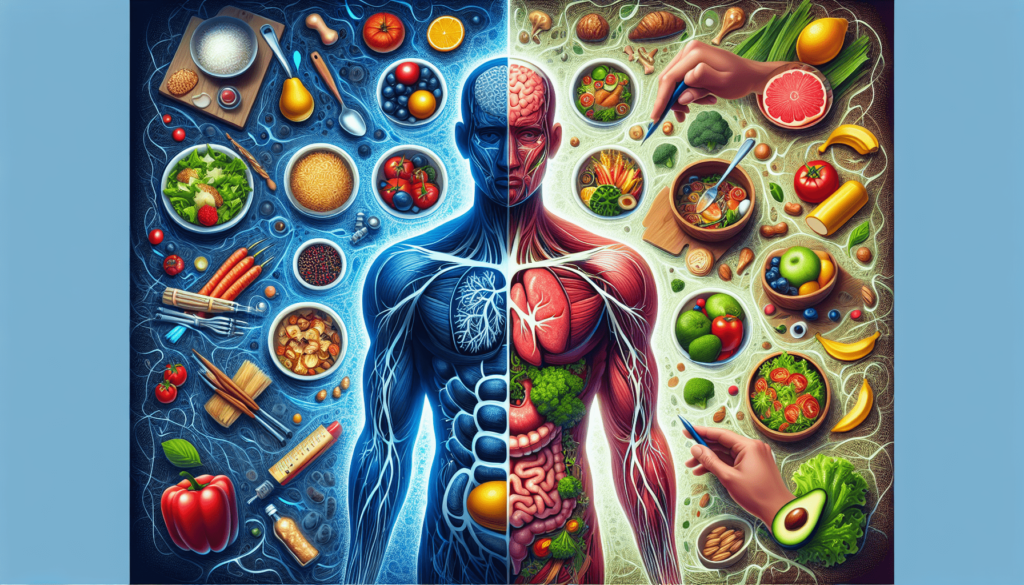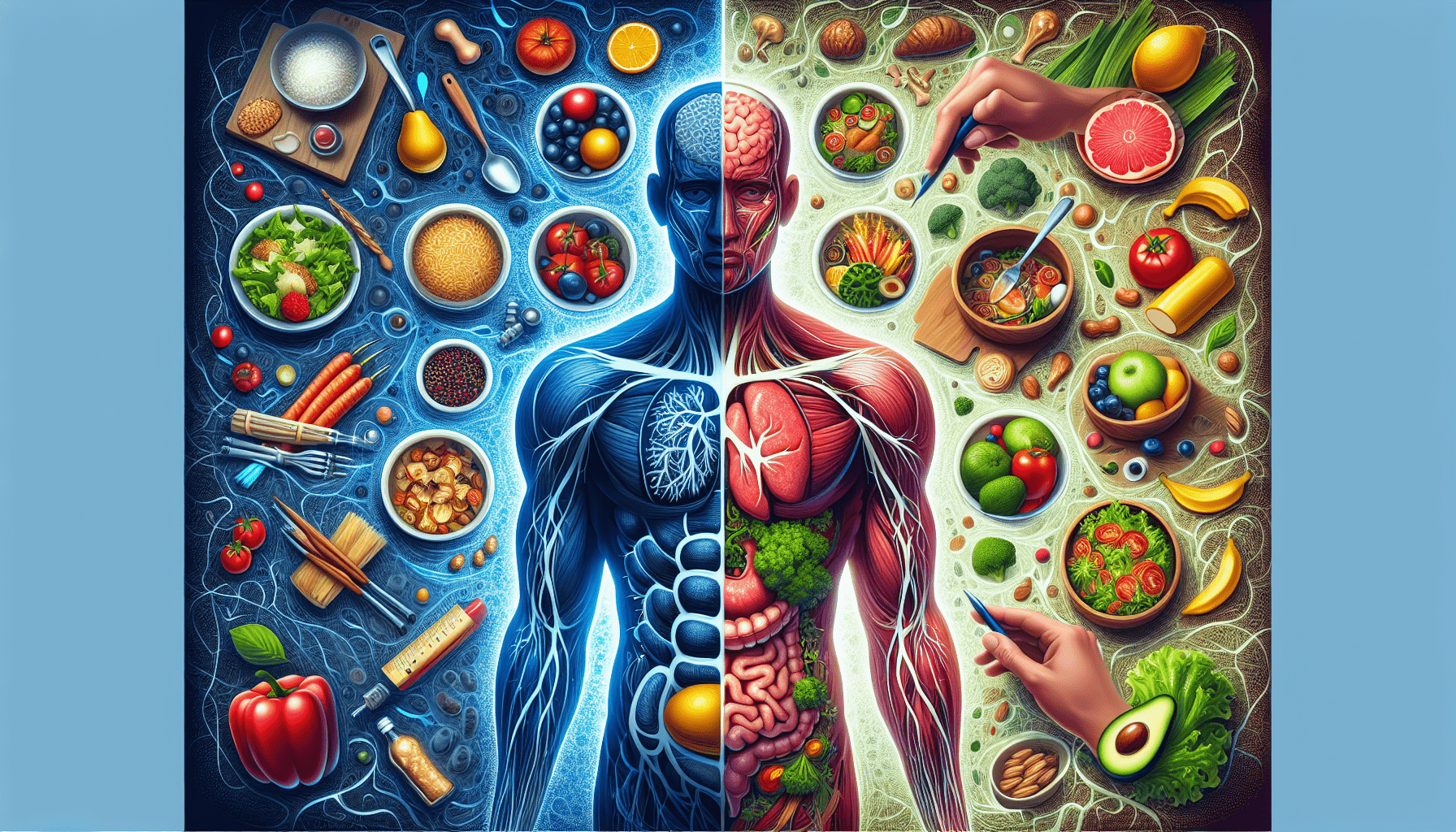Do you know the difference between diet and nutrition? While these terms are often used interchangeably, it’s important to understand that they are not the same thing. Diet refers to the specific food choices and eating habits of an individual, whereas nutrition is the science that examines the nutrients in those foods and how they impact our health. In this article, we will explore the distinction between diet and nutrition, and why it’s crucial to consider both when striving for a healthy lifestyle.

Definition of Diet
Different interpretations of the term
When we talk about “diet,” it often refers to the types and amounts of food you consume regularly. It can mean a specific eating pattern followed for weight loss, such as low-carb or high-protein diets. However, it’s important to note that “diet” doesn’t always imply restriction or a short-term plan. Your diet encompasses your overall eating habits, the foods you choose, and the way you nourish your body on a daily basis.
Importance of a balanced diet
A balanced diet is crucial for maintaining good health and well-being. It involves consuming a variety of foods from different food groups to ensure that your body receives all the essential nutrients it needs. A balanced diet is not about avoiding certain foods or focusing on specific macronutrients; rather, it’s about striking a harmonious balance to support optimal physical and mental function.
Definition of Nutrition
The science of nutrition
Nutrition is the study of how food and nutrients interact with our bodies to promote health and prevent disease. It encompasses the process of ingestion, digestion, absorption, and utilization of these nutrients. Nutrition explores the roles of various nutrients, bioactive compounds, and dietary patterns in maintaining our overall well-being. It is a science that continues to evolve as we uncover new information about the impact of food on our health.
Role of nutrients in the body
Nutrients are substances found in food that provide essential elements for growth, maintenance, and repair of body tissues. They include carbohydrates, proteins, fats, vitamins, minerals, and water. Each nutrient plays a unique role in supporting various bodily functions. Carbohydrates provide energy, proteins build and repair tissues, fats aid in nutrient absorption and insulation, vitamins and minerals are essential for metabolic processes, and water hydrates and lubricates our bodies.
Components of Diet
Food groups and their importance
A balanced diet consists of foods from different food groups, each playing a vital role in meeting our nutritional needs. These food groups include fruits, vegetables, grains, proteins, and dairy. Fruits and vegetables provide vitamins, minerals, and fiber. Grains are a significant source of energy and fiber, while proteins provide amino acids essential for building and repairing tissues. Dairy products supply calcium, vitamins, and proteins needed for bone health and various bodily functions.
Macronutrients and micronutrients
Macronutrients are nutrients that are needed in large quantities to sustain our bodies. These include carbohydrates, proteins, and fats. Carbohydrates are the primary source of energy, proteins are essential for growth and repair, and fats provide long-lasting energy and support various bodily functions. Micronutrients, on the other hand, are nutrients required in smaller amounts. These include vitamins and minerals, which are vital for supporting overall health and preventing deficiencies.
Caloric intake
Caloric intake refers to the total number of calories consumed from food and beverages. It’s important to consume an appropriate amount of calories to meet your energy needs and maintain a healthy weight. Caloric requirements vary depending on factors like age, sex, weight, and physical activity level. Consuming too few calories can lead to malnutrition and fatigue, while excessive calorie intake can lead to weight gain and increased risk of chronic diseases.
Types of Diets
Popular diet trends
There are various types of diets that people follow for different reasons. Some popular diet trends include the Mediterranean diet, vegetarian or vegan diets, ketogenic diet, paleo diet, and intermittent fasting. The Mediterranean diet emphasizes whole grains, fruits, vegetables, lean proteins, and healthy fats like olive oil. Vegetarian and vegan diets exclude animal products and focus on plant-based foods. The ketogenic diet prioritizes high-fat, low-carb foods. The paleo diet resembles the eating habits of our ancestors, focusing on unprocessed foods. Intermittent fasting involves cycles of fasting and eating within specific time frames.
Benefits and drawbacks
Each diet trend has its own set of benefits and drawbacks. For example, the Mediterranean diet has been associated with a reduced risk of heart disease and improved brain health. Vegetarian and vegan diets can help lower cholesterol levels and reduce the risk of certain cancers. The ketogenic diet may aid in weight loss and managing certain medical conditions, but it can be challenging to adhere to long-term. The paleo diet promotes whole, unprocessed foods but restricts grains and legumes, which may lead to nutrient deficiencies. Intermittent fasting may have benefits for weight management and metabolic health, but it may not be suitable for everyone.

Factors Influencing Diet Choices
Cultural and societal influences
Cultural and societal factors play a significant role in shaping our diet choices. Food habits and preferences are often passed down through generations and influenced by cultural traditions. Additionally, social norms, marketing strategies, and food availability impact our food choices. For example, certain cultures may have a strong preference for specific types of cuisine or rely heavily on certain staple foods. Societal factors, such as fast-food culture or food deserts in low-income areas, can affect the accessibility and affordability of nutritious foods.
Personal preferences and beliefs
Personal preferences and beliefs also impact our dietary choices. Some individuals may have specific dietary restrictions due to religious, ethical, or health-related reasons. Others may have personal preferences for certain flavors, textures, or food combinations. Some people may follow a specific diet plan based on their beliefs about what is healthy or effective for weight management. It’s important to respect and accommodate individual preferences and beliefs while also ensuring a balanced intake of essential nutrients.
Availability and accessibility of food
The availability and accessibility of food have a significant influence on our dietary choices. People living in urban areas often have greater access to a variety of foods, including fresh produce and specialty items. In contrast, individuals in rural or remote areas may face limited options and rely more on processed or shelf-stable foods. Additionally, economic factors can impact affordability, making healthier food options less accessible for some individuals or families. Food policies and initiatives that promote the availability of nutritious foods in all communities can help address these disparities.
Importance of a Nutrient-Rich Diet
Effects of a nutrient deficiency
A nutrient deficiency occurs when the body does not receive an adequate amount of one or more essential nutrients. This can lead to various health issues and impair bodily functions. For example, a deficiency in vitamin C may lead to scurvy, causing fatigue, weakness, and poor wound healing. Iron deficiency can cause anemia, leading to fatigue and reduced cognitive function. Lack of calcium can result in weakened bones and increased risk of osteoporosis. Proper nutrition is essential for preventing these deficiencies and maintaining optimal health.
Long-term health implications
Following a nutrient-rich diet has long-term implications for our health. Consuming an array of nutrients supports overall well-being and can reduce the risk of chronic diseases, such as heart disease, diabetes, and certain cancers. A diet rich in fruits, vegetables, whole grains, lean proteins, and healthy fats helps maintain healthy cholesterol levels, blood pressure, and blood sugar levels. It also promotes a healthy weight, enhances immunity, and supports proper organ function. By prioritizing nutrient-rich foods, you can support a lifetime of good health.
Impact on physical and mental well-being
Nutrition not only impacts physical health but also plays a crucial role in maintaining mental well-being. Certain nutrients, such as omega-3 fatty acids found in fatty fish, have been linked to improved brain function and reduced risk of depression. Adequate intake of B vitamins, found in whole grains and leafy greens, supports proper nervous system function and mental clarity. Additionally, a balanced diet can help stabilize mood, increase energy levels, and improve overall quality of life. Nourishing your body with nutrient-rich foods is a valuable investment in both your physical and mental well-being.

Understanding the Role of Nutrition
Absorption and digestion of nutrients
The process of nutrition begins with the ingestion of food and beverages, followed by digestion, absorption, and utilization of nutrients. Digestion breaks down food into smaller units through mechanical and chemical processes in the mouth, stomach, and intestines. Nutrients are then absorbed into the bloodstream and transported to various cells and tissues. The body utilizes these nutrients to support growth, repair, and maintenance of body tissues and for energy production.
Metabolism and energy production
Nutrition is closely tied to metabolism, which is the set of chemical reactions that occur in the body to convert food into energy. Carbohydrates, proteins, and fats are broken down during digestion to produce glucose, amino acids, and fatty acids, respectively. These molecules are then utilized by cells to generate adenosine triphosphate (ATP), the energy currency of the body. Proper nutrition provides the substrates and cofactors necessary for efficient metabolism and energy production.
Building and repairing body tissues
Nutrition is essential for the growth, repair, and maintenance of body tissues. Proteins, composed of amino acids, play a central role in building and repairing tissues such as muscles, organs, and skin. Without adequate protein intake, the body cannot efficiently rebuild and regenerate tissues, leading to impaired healing and reduced muscle strength. Nutrients provided by a balanced diet are essential for the synthesis of new cells and the maintenance of the body’s structural integrity.
Balancing Macronutrients in a Diet
Carbohydrates, proteins, and fats
Macronutrients are the major nutrients required in larger quantities. Carbohydrates are the primary source of energy for the body, found in foods like grains, fruits, and vegetables. Proteins are essential for building and repairing tissues, found in foods like lean meats, legumes, and dairy products. Fats provide energy and support many bodily functions, found in foods like avocados, nuts, and oils. Balancing the intake of these macronutrients is important for meeting energy needs and maintaining overall health.
Recommended daily intake
The recommended daily intake of macronutrients varies depending on factors such as age, sex, weight, and activity level. Carbohydrates should typically make up around 45-65% of total daily calories, proteins around 10-35%, and fats around 20-35%, while being mindful of the types of fats consumed. It’s important to note that individual requirements may vary, and it’s best to consult with a healthcare professional or registered dietitian for personalized recommendations.
Health implications of an imbalance
An imbalance in macronutrient intake can have health implications. Consuming excessive amounts of carbohydrates, especially refined sugars, can lead to weight gain, insulin resistance, and an increased risk of chronic diseases like diabetes and heart disease. Inadequate protein intake can result in muscle wasting, impaired immune function, and slowed wound healing. Consuming an excessive amount of unhealthy fats, such as trans fats, can increase the risk of cardiovascular diseases. Striking a balance and including a variety of nutrient-dense foods from all macronutrient groups is key to maintaining optimal health.

Micronutrients and Their Functions
Vitamins and minerals
Micronutrients are the vitamins and minerals that our bodies require in smaller amounts but are essential for numerous physiological processes. Vitamins are organic compounds that are necessary for growth, development, and the regulation of bodily functions. Minerals are inorganic elements that are crucial for the maintenance of cell structure, fluid balance, and enzymatic reactions. Both vitamins and minerals play unique roles in supporting overall health and well-being.
Importance of each micronutrient
Each micronutrient has its own specific functions and benefits. For example, vitamin C supports immune function and enhances iron absorption. Vitamin D aids in bone health and immune system regulation. B vitamins are essential for energy production and nervous system function. Minerals such as calcium, magnesium, and phosphorus are vital for strong bones and teeth. Iron is critical for oxygen transport in the body, while zinc supports immune function and wound healing. Consuming a diverse range of foods is key to obtaining an adequate supply of these essential micronutrients.
Common deficiencies and their effects
Deficiencies in certain micronutrients can lead to a host of health problems. For instance, a lack of vitamin D can result in weakened bones, increased risk of fractures, and compromised immune function. Insufficient iron intake can cause anemia, leading to fatigue, weakness, and impaired cognitive function. Low levels of vitamin B12 may cause anemia, fatigue, nerve damage, and mood disturbances. Calcium deficiency can contribute to weakened bones and an increased risk of osteoporosis. It’s essential to maintain a varied and nutrient-rich diet to prevent these deficiencies and support optimal health.
Achieving a Healthy Diet and Optimal Nutrition
Planning balanced meals
Planning balanced meals is crucial for achieving optimal nutrition. Include a variety of foods from all food groups to ensure a wide range of nutrients. Aim to fill half your plate with fruits and vegetables, incorporate whole grains, prioritize lean proteins, and include healthy fats. Experiment with different flavors, textures, and cooking methods to make your meals enjoyable and satisfying. Seek inspiration from recipes, cookbooks, or online resources that align with your taste preferences and dietary goals.
Label reading and portion control
Reading food labels can provide valuable information about the nutritional content of packaged foods. Pay attention to serving sizes, the macronutrient breakdown, and the ingredients list. Be mindful of added sugars, sodium, and unhealthy fats. Opt for foods with minimal processing and avoid highly processed options whenever possible. Additionally, practicing portion control can help maintain a healthy weight and prevent overconsumption. Pay attention to portion sizes and eat mindfully to give your body time to recognize satiety cues.
Seeking professional advice
If you’re unsure about your dietary choices or have specific health concerns, it’s important to seek professional advice. Registered dietitians or healthcare professionals with a background in nutrition can provide personalized guidance based on your unique needs and goals. They can help assess your current diet, identify areas for improvement, and design a meal plan that supports your overall well-being. Seeking professional guidance can provide you with the knowledge and tools necessary to achieve a healthy diet and optimal nutrition.
In conclusion, understanding the difference between diet and nutrition is essential for adopting a holistic approach to nourishing your body. While diet refers to your eating habits and the types of food you consume, nutrition is the science behind how nutrients in food interact with your body. Following a balanced diet that encompasses all food groups, macronutrients, and micronutrients is vital for maintaining proper nutrition and achieving optimal health. Factors such as cultural influences, personal preferences, and food availability can impact your diet choices. Prioritizing nutrient-rich foods can prevent deficiencies, support long-term health, and enhance physical and mental well-being. By understanding the role of nutrition and balancing macronutrients, you can ensure that your body receives the necessary fuel for energy production, tissue repair, and overall growth. Attention to micronutrients is equally important, as they play crucial roles in various physiological processes. Lastly, achieving a healthy diet and optimal nutrition requires planning balanced meals, reading food labels, practicing portion control, and seeking professional advice when needed. By incorporating these strategies into your lifestyle, you can embark on a journey towards a healthier, happier you.

